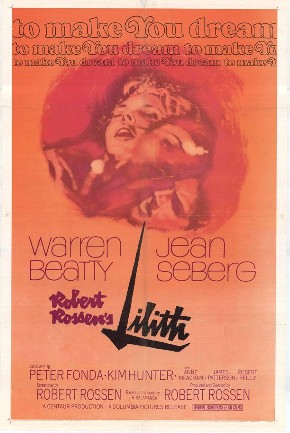On November 27th, 2022, the 8,000th article was added to the SuccuWiki!
Lilith (film)
| Lilith | |
|---|---|
 Movie poster for the film Lilith | |
| Directed by | Robert Rossen |
| Produced by | Robert Rossen |
| Written by | Robert Rossen |
| Starring |
Warren Beatty Jean Seberg Peter Fonda Kim Hunter Jessica Walter |
| Music by | Kenyon Hopkins |
| Cinematography | Eugen Schüfftan |
| Editing by | Aram Avakian |
| Distributed by | Columbia Pictures |
| Release date(s) | September 27, 1964 |
| Running time | 114 minutes |
| Country | United States |
| Language | English |
| Box office | $1,100,000[1] |
For other uses of the name Lilith, see Lilith (disambiguation)
Lilith is a 1964 American film written and directed by Robert Rossen. It is based on a novel by J. R. Salamanca and stars Warren Beatty, Jean Seberg, Peter Fonda, Kim Hunter and Gene Hackman. The movie was filmed at Chestnut Lodge in Rockville, Maryland.
Plot Summary
Set in a private mental institution, it tells of a trainee occupational therapist Vincent Bruce (Beatty) who becomes dangerously obsessed with a seductive, very able, schizophrenic patient Lilith Arthur (Seberg). After engineering the suicide of another patient (Fonda) out of jealousy for his crush on Lilith, Bruce presents himself for psychiatric help to his superiors.
Filming Notes
Chestnut Lodge would not permit filming on location so those scenes were done in a vacant mansion rented by the production company, Centur Productions, on the North Shore of Long Island (Locust Valley). Location shooting in Maryland was done in a private home in Rockville as well as in the downtown area, plus scenes at Great Falls on both the Maryland and Virginia sides of the Potomac River, as well as a staged carnival scene at Barnssville, Maryland.
This was Robert Rossen's last film.
Reputation
In The New Biographical Dictionary of Film David Thomson describes Lilith as "an oddity, the only one of Rossen's films that seems passionate, mysterious and truly personal. The other films will look increasingly dated and self-contained, but Lilith may grow."[2]
References